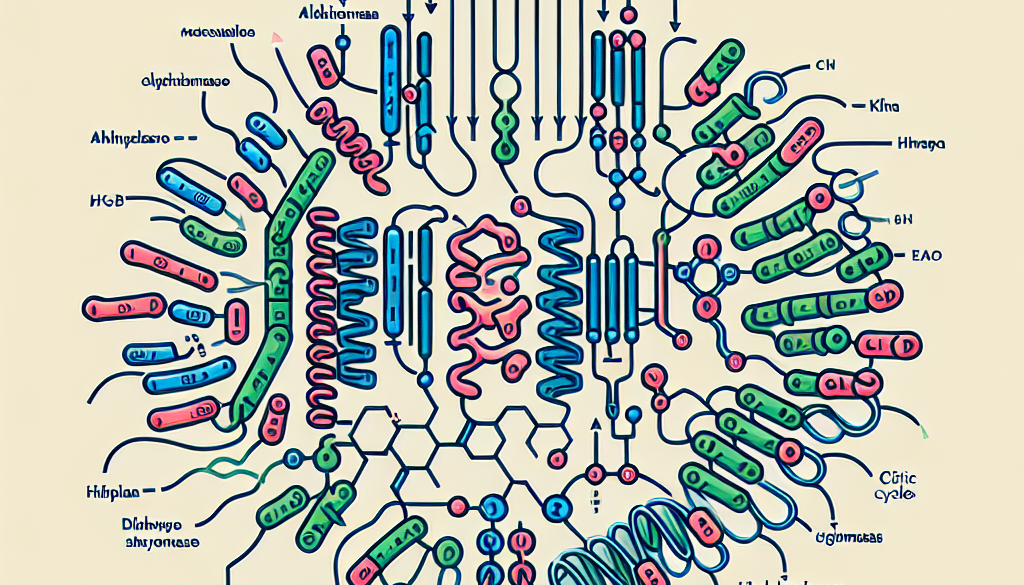α-Ketoglutarate Dehydrogenase Complex Simplified
-
Table of Contents
- α-Ketoglutarate Dehydrogenase Complex Simplified: Essential Insights
- Introduction to α-Ketoglutarate Dehydrogenase Complex
- Understanding the Structure and Function
- Components of the α-KGDHC
- Role in Cellular Metabolism
- Implications of α-KGDHC Dysfunction
- Regulation of α-KGDHC Activity
- Research and Clinical Significance
- Advancements in α-KGDHC Research
- Conclusion: Key Takeaways on α-Ketoglutarate Dehydrogenase Complex
- Explore ETprotein’s High-Quality Protein Products
α-Ketoglutarate Dehydrogenase Complex Simplified: Essential Insights
Introduction to α-Ketoglutarate Dehydrogenase Complex
The α-Ketoglutarate Dehydrogenase Complex (α-KGDHC) is a pivotal enzyme complex in cellular metabolism, playing a crucial role in the Krebs cycle (also known as the citric acid cycle). This cycle is fundamental for energy production in aerobic organisms, converting biochemical energy from nutrients into the adenosine triphosphate (ATP), which cells use for energy.
Understanding the Structure and Function
The α-KGDHC is located in the mitochondria, the powerhouse of the cell. It catalyzes the conversion of α-ketoglutarate into succinyl-CoA, a transformation that is critical for the continuation of the Krebs cycle. This process not only helps in energy production but also in the synthesis of several key molecules, including amino acids and glucose.
Components of the α-KGDHC
- E1 – Oxoglutarate dehydrogenase: This component initiates the process by decarboxylating α-ketoglutarate.
- E2 – Dihydrolipoamide succinyltransferase: It transfers the succinyl group to CoA, forming succinyl-CoA.
- E3 – Dihydrolipoamide dehydrogenase: This final component regenerates the lipoamide needed for the activity of E2 and also facilitates the reduction of NAD+ to NADH, which is later used in the electron transport chain.
Role in Cellular Metabolism
The α-KGDHC is not only crucial for energy production but also plays a significant role in cellular signaling and regulation. The production of NADH and succinyl-CoA influences several other metabolic pathways, including fatty acid synthesis and the regulation of the urea cycle.
Implications of α-KGDHC Dysfunction
Dysfunction in α-KGDHC has been linked to various diseases, particularly neurodegenerative diseases such as Alzheimer’s and Parkinson’s. The enzyme’s dysfunction leads to a decrease in cellular energy production and an increase in oxidative stress, contributing to cell damage and death.
Regulation of α-KGDHC Activity
The activity of α-KGDHC is tightly regulated by several factors to ensure metabolic balance:
- Substrate Availability: The availability of α-ketoglutarate and NAD+ directly affects the activity of α-KGDHC.
- Product Inhibition: Accumulation of succinyl-CoA and NADH can inhibit the complex.
- Phosphorylation: Phosphorylation of the E1 component can decrease the enzyme’s activity, modulating the energy production rate.
Research and Clinical Significance
Understanding the α-KGDHC is crucial for developing therapeutic strategies against metabolic and neurodegenerative diseases. Researchers are exploring ways to modulate its activity through genetic and pharmacological means to increase or decrease its activity based on the therapeutic needs.
Advancements in α-KGDHC Research
Recent studies have focused on developing specific inhibitors and activators of α-KGDHC. These could potentially be used to manipulate its activity in various disease states, offering new avenues for treatment strategies.
Conclusion: Key Takeaways on α-Ketoglutarate Dehydrogenase Complex
The α-Ketoglutarate Dehydrogenase Complex is a central component of cellular metabolism, essential for energy production and metabolic regulation. Its dysfunction is linked to severe metabolic and neurodegenerative disorders, making it a significant target for research and therapeutic intervention. Understanding and manipulating its activity could lead to breakthroughs in treating a range of diseases.
Explore ETprotein’s High-Quality Protein Products
If you are looking for premium protein products that support health and wellness, consider ETprotein. They offer a wide range of high-quality, organic protein powders perfect for various applications, from sports nutrition to health supplements.
ETprotein is α-Ketoglutarate Factory Manufacturer and Supplier in China, Check further information by visiting the α-Ketoglutarate Product Page
Request Quotation and Samples of α-Ketoglutarate from ETprotein
About ETprotein
ETprotein, a reputable protein and elite nutrition ingredients α-Ketoglutarate Chinese factory manufacturer and supplier, is renowned for producing, stocking, exporting, and delivering the highest quality organic bulk vegan proteins and elite nutritional ingredients α-Ketoglutarate. They include Organic rice protein, clear rice protein, pea protein, clear pea protein, watermelon seed protein, pumpkin seed protein, sunflower seed protein, mung bean protein, peanut protein. Their offerings, characterized by a neutral taste, non-GMO, allergen-free attributes, cater to a diverse range of industries. They serve nutraceutical, pharmaceutical, cosmeceutical, veterinary, as well as food and beverage finished product distributors, traders, and manufacturers across Europe, USA, Canada, Australia, Thailand, Japan, Korea, Brazil, and Chile, among others.
ETprotein specialization includes exporting and delivering tailor-made protein powder and finished nutritional supplements. Their extensive product range covers sectors like Food and Beverage, Sports Nutrition, Weight Management, Dietary Supplements, Health and Wellness Products, and Infant Formula, ensuring comprehensive solutions to meet all your protein needs.
As a trusted company by leading global food and beverage brands and Fortune 500 companies, ETprotein reinforces China’s reputation in the global arena. For more information or to sample their products, please contact them and email sales(at)ETprotein.com today.














